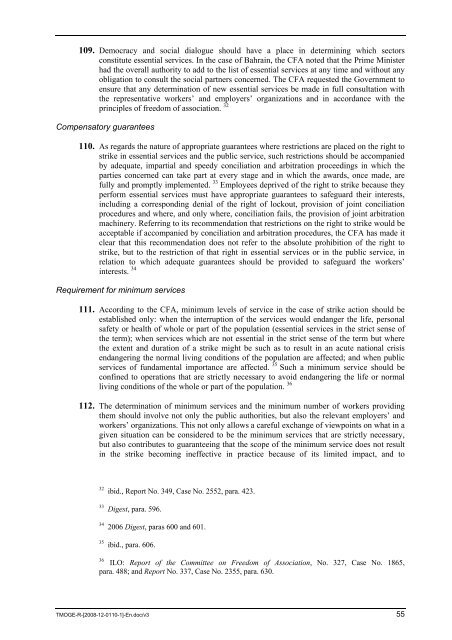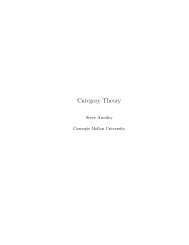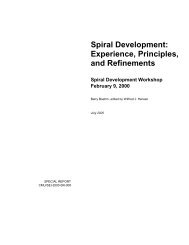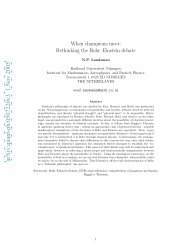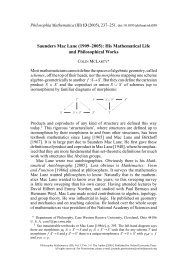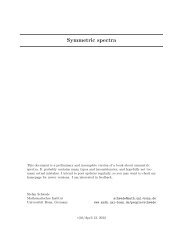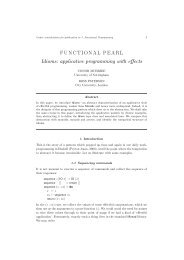wcms_161662
wcms_161662
wcms_161662
You also want an ePaper? Increase the reach of your titles
YUMPU automatically turns print PDFs into web optimized ePapers that Google loves.
109. Democracy and social dialogue should have a place in determining which sectors<br />
constitute essential services. In the case of Bahrain, the CFA noted that the Prime Minister<br />
had the overall authority to add to the list of essential services at any time and without any<br />
obligation to consult the social partners concerned. The CFA requested the Government to<br />
ensure that any determination of new essential services be made in full consultation with<br />
the representative workers’ and employers’ organizations and in accordance with the<br />
principles of freedom of association. 32<br />
Compensatory guarantees<br />
110. As regards the nature of appropriate guarantees where restrictions are placed on the right to<br />
strike in essential services and the public service, such restrictions should be accompanied<br />
by adequate, impartial and speedy conciliation and arbitration proceedings in which the<br />
parties concerned can take part at every stage and in which the awards, once made, are<br />
fully and promptly implemented. 33 Employees deprived of the right to strike because they<br />
perform essential services must have appropriate guarantees to safeguard their interests,<br />
including a corresponding denial of the right of lockout, provision of joint conciliation<br />
procedures and where, and only where, conciliation fails, the provision of joint arbitration<br />
machinery. Referring to its recommendation that restrictions on the right to strike would be<br />
acceptable if accompanied by conciliation and arbitration procedures, the CFA has made it<br />
clear that this recommendation does not refer to the absolute prohibition of the right to<br />
strike, but to the restriction of that right in essential services or in the public service, in<br />
relation to which adequate guarantees should be provided to safeguard the workers’<br />
interests. 34<br />
Requirement for minimum services<br />
111. According to the CFA, minimum levels of service in the case of strike action should be<br />
established only: when the interruption of the services would endanger the life, personal<br />
safety or health of whole or part of the population (essential services in the strict sense of<br />
the term); when services which are not essential in the strict sense of the term but where<br />
the extent and duration of a strike might be such as to result in an acute national crisis<br />
endangering the normal living conditions of the population are affected; and when public<br />
services of fundamental importance are affected. 35 Such a minimum service should be<br />
confined to operations that are strictly necessary to avoid endangering the life or normal<br />
living conditions of the whole or part of the population. 36<br />
112. The determination of minimum services and the minimum number of workers providing<br />
them should involve not only the public authorities, but also the relevant employers’ and<br />
workers’ organizations. This not only allows a careful exchange of viewpoints on what in a<br />
given situation can be considered to be the minimum services that are strictly necessary,<br />
but also contributes to guaranteeing that the scope of the minimum service does not result<br />
in the strike becoming ineffective in practice because of its limited impact, and to<br />
32 ibid., Report No. 349, Case No. 2552, para. 423.<br />
33 Digest, para. 596.<br />
34 2006 Digest, paras 600 and 601.<br />
35 ibid., para. 606.<br />
36 ILO: Report of the Committee on Freedom of Association, No. 327, Case No. 1865,<br />
para. 488; and Report No. 337, Case No. 2355, para. 630.<br />
TMOGE-R-[2008-12-0110-1]-En.doc/v3 55


